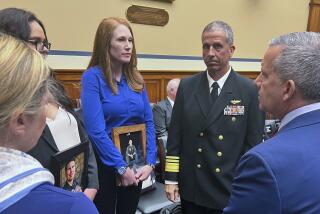House Approves Bates’ Compromise to Force Upgrade of Super Stallion Copters
- Share via
WASHINGTON — The House on Monday approved compromise language in its 1988 defense bill barring future deliveries of the controversial Super Stallion helicopters if engineers fail to solve vibration problems that plague the aircraft.
Under an amendment approved on a voice vote by the House, deliveries of the heavy-lift, troop-carrying helicopter would be halted sometime in late 1988, “unless the helicopter incorporates design changes to improve flight stability,” the amendment said.
The CH-53E Super Stallion has been involved in a string of accidents since 1984 that have left 20 Marines dead and 17 injured.
Rep. Jim Bates (D-San Diego) originally planned an amendment to kill the $210 million the Defense Department had requested for 14 new Super Stallions until a determination was made on the safety of the aircraft. But after a round of meetings with Navy and Marine representatives and other members of Congress, he decided to introduce the toned-down amendment to the House’s $289-billion defense bill.
Killing of Program Opposed
But Rep. Robert E. Badham (R-Newport Beach), a member of the House Armed Services Committee, said the amendment merely “codifies” what has already been agreed to by the Navy and Sikorsky Aircraft, the Connecticut company that builds the helicopter.
Badham announced earlier this year that his congressional investigation into the Super Stallion had uncovered military documents that showed the Navy had known about potentially dangerous vibrations for more than 10 years and had done little to correct them.
“Taxpayers should not be buying a helicopter that does not work,” Bates told the House Monday.
In an earlier letter to other congressman, Bates said: “I encourage you to take a stand for moral accountability and help bury the ‘flying coffin’ before one more Marine dies.”
Badham contended that killing the Super Stallion outright would cost taxpayers at least $250 million because of the multiyear contract between the government and Sikorsky. Even then, Badham said, the government would be left without a solution to fix the 93 helicopters already in use by the Marines and the Navy.
The amendment passed Monday would not affect any Super Stallion funded under previous congressional appropriations.
Sikorsky and the Navy have already begun a 15-month test program to determine the seriousness of the aircraft’s vibrations. They will report their findings to Congress.
The congressional battle over the Super Stallion may not be over.
The Senate version of the defense bill calls for the government to withhold 70% of the 1988 tax dollars for the Super Stallion until Congress receives more information about the helicopter’s airworthiness.
“Because of the safety problems of the CH-53E helicopter, the committee does not recommend authorization at this time for procurement of CH-53E helicopters in the fiscal year 1989,” a Senate report on the defense bill said.
The differences in the budgets will be worked out later in a House-Senate conference committee.
More to Read
Sign up for Essential California
The most important California stories and recommendations in your inbox every morning.
You may occasionally receive promotional content from the Los Angeles Times.








